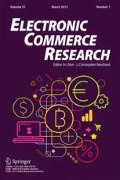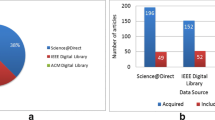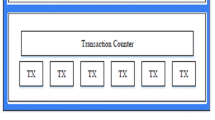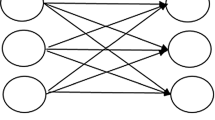Abstract
In the Bitcoin system, large numbers of miners invest massive computing resources in the blockchain mining process in pursuit of Bitcoin rewards, which are comprised of a fixed amount of system-generated new block reward and a variable amount of user-submitted transaction fees. Here, transaction fees serve as the important tuner for the Bitcoin system to define the priorities in users’ transaction confirmation. In this paper, we aim to study the priority rule for queueing transactions based on their associated fees, and in turn users’ strategies in formulating their fees in the transaction confirmation game. We first establish a full-information game-theoretical model to study users’ equilibrium fee decisions; and then discuss three types of Nash equilibria, under which no, all and some users submit transaction fees. Moreover, we conduct empirical studies and design computational experiments to validate our theoretical analysis. The experimental results show that (1) users’ fee decisions will be significantly affected by their waiting time; (2) the reduced time costs, instead of transaction values, are the basis for users to evaluate their revenues; (3) longer waiting time and higher unit time cost drive users to submit transaction fees in pursuit of desired priorities; (4) with the required transaction fee increasing, the proportion of fee-submitting users decreases slowly at first followed by a sharp decline, and over-high required fees will make the transaction confirmation game end up with no users submitting fees.









Similar content being viewed by others
Notes
Source: https://www.blockchain.com.
Y-axis is logarithmic scale.
References
Nakomoto, S. (2008). A peer-to-peer electronic cash system. White paper. https://bitcoin.org/bitcoin.
Alabi, K. (2017). Digital blockchain networks appear to be following Metcalfe’s Law. Electronic Commerce Research and Applications, 24, 23–29.
Zhang, Y., Deng, R. H., Liu, X., & Zheng, D. (2018). Blockchain based efficient and robust fair payment for outsourcing services in cloud computing. Information Science, 462(2018), 262–277.
Hawlitschek, F., Notheisen, B., & Teubner, T. (2018). The limits of trust-free systems: A literature review on blockchain technology and trust in the sharing economy. Electronic Commerce Research and Applications, 29, 50–63.
Li, J., Yuan, Y., & Wang, F. (2019). A novel GSP auction mechanism for ranking Bitcoin transactions in blockchain mining. Decision Support Systems. https://doi.org/10.1016/j.dss.2019.113094.
Cong, L. W., & He, Z. (2017). Blockchain disruption and smart contracts. SSRN Electronic Journal. https://doi.org/10.2139/ssrn.2985764.
Pisa, M., & Juden, M. (2017). Blockchain and economic development: Hype vs. reality. Center for Global Development Policy Paper.
Easley, D., O’Hara, M., & Basu, S. (2019). From mining to markets: The evolution of Bitcoin transaction fees. Journal of Financial Economics. https://doi.org/10.1016/j.jfineco.2019.03.004.
Huberman, G., Leshno, J., & Moallemi, C. (2017). Monopoly without a monopolist: An economic analysis of the Bitcoin payment system. SSRN Electronic Journal. https://doi.org/10.2139/ssrn.3025604.
Kasahara, S., & Kawahara, J. (2016). Effect of Bitcoin fee on transaction-confirmation process. Journal of Industrial and Management Optimization. https://doi.org/10.3934/jimo.2018047.
Li, J., Yuan, Y., Wang, S., & Wang, F. (2018). Transaction queue game in Bitcoin Blockchain. In The 2018 IEEE intelligent vehicles symposium (IV’18), Changshu, China, June 26–30 (pp. 114–119).
Houy, N. (2014). The economics of Bitcoin transaction fees. SSRN Electronic Journal. https://doi.org/10.2139/ssrn.2400519.
Yuan, Y., & Wang, F.-Y. (2016). Blockchain: The state of the art and future trends. Acta Automatica Sinica, 42(4), 481–494.
Yuan, Y., & Wang, F.-Y. (2017). Parallel blockchain: Concept. Methods and Issues, IEEE/CAA Journal of Automatica Sinica, 43(10), 1703–1712.
Eyal, I., & Sirer, E. G. (2014). Majority is not enough: Bitcoin mining is vulnerable. In International conference on financial cryptography and data security (pp. 436–454). Berlin: Springer.
Kaskaloglu, K. (2014). Near zero Bitcoin transaction fees cannot last forever. In The international conference on digital security and forensics (pp. 91–99).
Back, A. (2002). Hashcash: A denial of service counter-measure. In USENIX technical conference.
Moser, M., & Bohme, R. (2015). Trends, tips, tolls. A longitudinal study of Bitcoin transaction fees. In International conference on financial cryptography and data security (pp. 19–33). Berlin: Springer.
Davidson, S., De Filippi, P., & Potts, J. (2016). Economics of Blockchain. SSRN Electronic Journal. https://doi.org/10.2139/ssrn.2744751.
Catalini, C., & Gans, J. S. (2016). Some simple economics of the blockchain. SSRN Electronic Journal. https://doi.org/10.2139/ssrn.2874598.
Csoka, P., & Herings, P. J. (2017). Decentralized clearing in financial networks. Management Science. https://doi.org/10.1287/mnsc.2017.2847.
Kroll, J. A., Davey, I. C., & Felten, E. W. (2013). The economics of Bitcoin mining, or Bitcoin in the presence of adversaries. In Proceedings of Weis.
Lavi, R., Sattath, O., & Zohar, A. (2019). Redesigning Bitcoin’s fee market. In The world wide web conference (pp. 2950–2956). New York: ACM.
Iyidogan, E. (2018). Economic model of blockchain based cryptocurrencies. SSRN Electronic Journal. https://doi.org/10.2139/ssrn.3152803.
Chalkias, K., & Dionysiou, I. (2016). Going beyond the coinbase transaction fee: Alternative reward schemes for miners in blockchain systems. In Pan-Hellenic conference on informatics (p. 35). Berlin: ACM.
Wong, J. I. (2014). New study: Low Bitcoin transaction fees unsustainable. http://www.coindesk.com/new-study-low-Bitcoin-transaction-fees-unsustainable. Accessed 13 October.
Abdullah, A. (2018). Bitcoin transaction fee estimation using Mempool state and linear perceptron machine learning algorithm. Master’s Projects. 638.
Leme, R. P., & Pure, T. E., (2010). Bayes–Nash price of anarchy for generalized second price auction. In IEEE 51st annual symposium on foundations of computer science (pp. 735–744). New York: IEEE.
Kella, O., & Yechiali, U. (2007). Waiting times in the non-preemptive priority M/M/c queue. Communications in Statistics Stochastic Models, 1(2), 257–262.
Krishna, V. (2010). Auction theory. Berlin: Elsevier.
Acknowledgements
We gratefully acknowledge the funding supports from the National Natural Science Foundation of China (#61533019).
Author information
Authors and Affiliations
Corresponding author
Ethics declarations
Conflict of interest
The authors declare that they have no conflict of interest.
Additional information
Publisher's Note
Springer Nature remains neutral with regard to jurisdictional claims in published maps and institutional affiliations.
Rights and permissions
About this article
Cite this article
Li, J., Yuan, Y. & Wang, FY. Analyzing Bitcoin transaction fees using a queueing game model. Electron Commer Res 22, 135–155 (2022). https://doi.org/10.1007/s10660-020-09414-3
Published:
Issue Date:
DOI: https://doi.org/10.1007/s10660-020-09414-3




